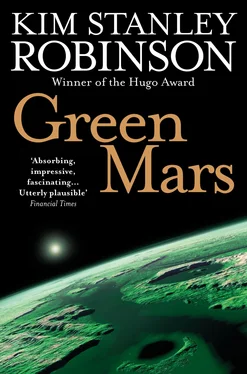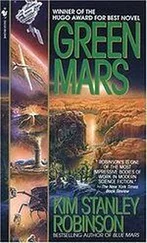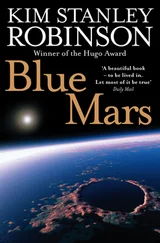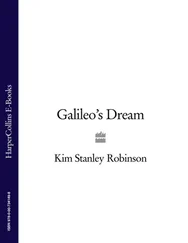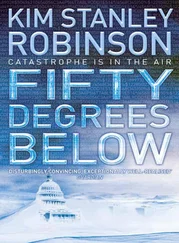“But yes!” Michel said when Nirgal mentioned this observation to him. “Very good, Nirgal. Your sight has such insight. In archetypal terminologies we might call green and white the Mystic and the Scientist. Both extremely powerful figures, as you see. But what we need, if you ask me, is a combination of the two, which we call the Alchemist .”
The green and the white.
Afternoons the children were free to do what they wanted, and sometimes they stayed with the day’s teacher, but more often they ran on the beach or played in the village, which lay nestled in its cluster of low hills, halfway between the lake and the tunnel entrance. They climbed the spiralling staircases of the big bamboo treehouses, and played hide and seek among the stacked rooms and the daughter shoots and the hanging bridges connecting them. The bamboo dorms made a crescent which held most of the rest of the village inside it; each of the big shoots was five or seven segments high, each segment a room, getting smaller as they got higher. The children each had rooms of their own in the top segments of the shoots—windowed vertical cylinders that were four or five steps across, like the towers of the castles in their stories. Below them in the middle segments the adults had their rooms, mostly alone but sometimes in couples; and the bottom segments were living rooms. From the windows of their top rooms they looked down on the village rooftops, clustered in the circle of hills and bamboo and greenhouses like mussels in the lake shallows.
On the beach they hunted shells or played German dodgeball, or shot arrows across the dunes into blocks of foam. Usually Jackie and Dao chose the games, and led the teams if there were teams. Nirgal and the younger ones followed them, cycling through their various friendships and hierarchies, which were honed endlessly in the daily play. As little Frantz once crudely explained it to Nadia, “Dao hits Nirgal; Nirgal hits me; I hit the girls.” Often Nirgal got tired of that game, which Dao always won, and for better fun he would take off running around the lake, slowly and steadily, falling into a rhythm which seemed to encompass everything in the world. He could circle the lake for as long as the day lasted when he got in that rhythm. It was a joy, an exhilaration.
Under the dome it was always cold, but the light was perpetually changing. In summer the dome glowed bluish white all the time, and pencils of lit air stood under the skylight shafts. In winter it was dark, and the dome flared with reflected lamplight, like the inside of a mussel shell. In spring and autumn the light would dim in the afternoon to a grey and ghostly dusk, the colours only suggested by the many shades of grey, the bamboo leaves and pine needles all ink strokes against the faint white of the dome. In those hours the greenhouses were like big fairy lamps on the hills, and the kids would wander home criss-crossing like gulls, and head for the bathhouse. There in the long building beside the kitchen they would pull off their clothes and run into the steamy clangour of the big main bath, sliding around on the bottom tiles feeling heat buzz back into their hands and feet and faces as they splashed friskily around the soaking ancients, with their turtle faces and their wrinkled hairy bodies.
After that warm wet hour they dressed, and trooped into the kitchen, damp and pink-skinned, queuing up and filling their plates, sitting at the long tables scattered among the adults. There were one hundred and twenty-four permanent residents, but usually about two hundred people there at any given time. When everyone was seated they took up the water pitchers and poured each other’s water, and then they tore into the hot food with gusto, downing potatoes, tortillas, pasta, tabouli, bread, a hundred kinds of vegetables, occasionally fish or chicken. After the meal the adults would talk about crops or their Rickover, an old integral fast reactor they were very fond of, or about Earth—while the kids cleaned up and then played music for an hour and then games, as everyone began the slow process of falling asleep.
One day before dinner a group of twenty-two people arrived from around the polar cap. Their little dome had lost its ecosystem to what Hiroko called spiralling complex disequilibrium, and their reserves had run out. They needed sanctuary.
Hiroko put them in three of the newly-mature treehouses. They climbed the staircases spiralling up the outsides of the fat round shoots, exclaiming at the cylindrical segments with their doors and windows cut into them. Hiroko put them to work finishing construction on new rooms, and building a new greenhouse at the edge of the village. It was obvious to all that Zygote was not growing as much food as they now needed. The kids ate as modestly as they could, imitating the adults. “Should have called the place Gamete,” Coyote said to Hiroko on his next time through, laughing harshly.
She only waved him away. But perhaps worry accounted for Hiroko’s more distant air. She spent all her days in the greenhouses at work, and seldom taught the children any more. When she did they only followed her around and worked for her, harvesting or turning compost or weeding. “She doesn’t care about us,” Dao said angrily one afternoon as they walked down the beach. He directed his complaint at Nirgal. “She isn’t really our mother anyway.” He led them all to the labs by the tunnel hill greenhouse, chivvying them along as he could so well.
Inside, he pointed to a row of fat magnesium tanks, something like refrigerators. “Those are our mothers. That’s what we were grown inside. Kasei told me, and I asked Hiroko and it’s true. We’re ectogenes. We weren’t born, we were decanted. ” He glared triumphantly at his frightened, fascinated little band; then he struck Nirgal full on the chest with his fist, knocking Nirgal clear across the lab, and left with a curse. “We don’t have parents.”
Extra visitors were a burden now, but still when they came there was a lot of excitement, and many people stayed up most of the first night of a visit, talking, getting all the news they could of the other sanctuaries. There was a whole network of these in the south polar region: Nirgal had a map in his lectern, with red dots to show all thirty-four. And Nadia and Hiroko guessed that there were more, in other networks to the north, or in complete isolation. But as they all kept radio silence, there was no way to be sure. So news was at a premium—it was usually the most precious thing that visitors had, even if they came laden with gifts which they usually did, giving out whatever they had managed to make or obtain that their hosts would find useful.
During these visits Nirgal would listen hard to the nights’ long animated conversations, sitting on the floor or wandering and refilling people’s teacups. He felt acutely that he did not understand the rules of the world; it was inexplicable to him why people acted as they did. Of course he did understand the basic fact of the situation—that there were two sides, locked in a contest for control of Mars—that Zygote was the leader for the side that was right—and that eventually the areophany would triumph. It was a tremendous feeling to be involved in that struggle, to be a crucial part of the story, and it often left him sleepless when he dragged off to bed, his mind dancing through to dawn with visions of all he would contribute to this great drama, amazing Jackie and everyone else in Zygote.
Sometimes, in his desire to learn more, he even eavesdropped. He did it by lying on a couch in the corner and staring at a lectern, doodling or pretending to read. Quite often people elsewhere in the room didn’t realise he was listening, and sometimes they would even talk about the children of Zygote—mostly when he was actually skulking out in the hall.
Читать дальше
